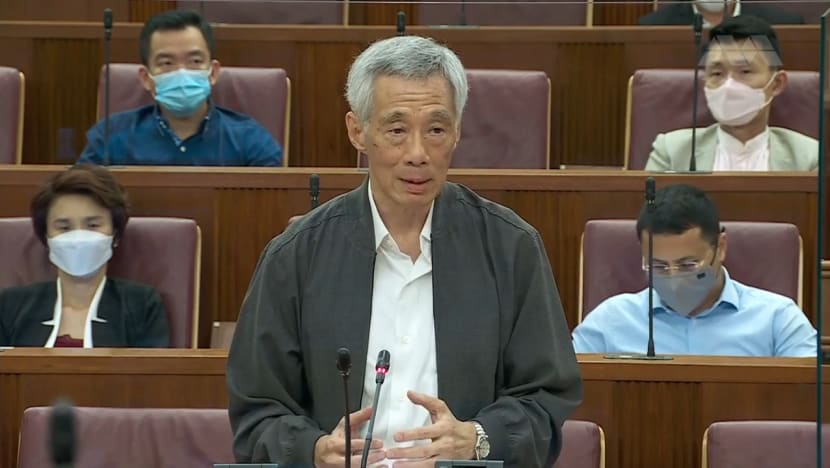Singapore 'heading for trouble' if it lets transgressions pass; referring WP leaders to public prosecutor 'best way forward': PM Lee

Prime Minister Lee Hsien Loong speaking in Parliament on Feb 15, 2022.
SINGAPORE: Singapore is “heading for trouble” if it lets “flagrant, egregious” transgressions pass, and referring the Workers’ Party leaders to the public prosecutor is the “best way forward”, said Prime Minister Lee Hsien Loong on Tuesday (Feb 15).
Mr Lee was speaking in a debate on two motions addressing the final report by the Committee of Privileges (COP).
The two motions were related to the committee’s recommendations relating to the fine for Ms Khan’s lie in Parliament, and its suggestion to refer Mr Pritam Singh and Mr Faisal Manap to the public prosecutor for possible offences under the Parliament (Privileges, Immunities and Powers) Act.
“Trust is crucial for democracy to work well. Being truthful is fundamental to establishing trust. Honesty is non-negotiable,” said Mr Lee.
“If you tell lies, how can the public trust you? If someone in a position of responsibility tells lies, and visibly gets away with it, how can the public trust the system? And if Parliament condones lying among its own members, how can Singaporeans trust the institution of Parliament?
“If we let flagrant, egregious transgressions pass, it will erode trust in our leaders, respect for Parliament, and support for our whole political system. And Singapore will be heading for trouble.”
The COP released its final report last Thursday, recommending former Workers’ Party MP Raeesah Khan be fined S$35,000 for lying in Parliament.
In a speech in August 2021, Ms Khan lied about accompanying a sexual assault victim to the police station in an anecdote that alleged the police had mishandled the case.
In November 2021, she admitted in Parliament that she lied, saying it was because she did not want to reveal that she had heard the anecdote in a support group, which she had attended as a survivor of sexual assault. Ms Khan subsequently resigned as an MP and from the WP.
The committee also proposed that WP secretary-general Pritam Singh and vice-chair Faisal Manap, both Aljunied GRC MPs, be referred to the public prosecutor for further investigations.
In reaching its findings, the committee said it was “satisfied” that the WP leaders had lied while testifying about the incident.
The COP said it found Ms Khan guilty of abuse of privilege for telling an untruth in the House on Aug 3, and then repeating it on Oct 4.
The report said from Aug 8 onwards however, Ms Khan was acting under the guidance of three senior WP leaders, to "keep to the untruth", and on Oct 3 she was given further guidance by Mr Singh to continue lying.
The leaders refer to Mr Singh, Mr Faisal and WP chair Sylvia Lim.
Adding that he believes what the committee recommends as “the best way forward”, Mr Lee said: “Since a criminal offence appears to have been committed, let Parliament refer the matter to the public prosecutor. Let the public prosecutor consider the evidence afresh, let the system work.
“If the charges are filed, Mr Pritam Singh and also Mr Faisal Manap can defend themselves in court. The court will have to be satisfied that their guilt has been established beyond reasonable doubt,” he continued.
“And if they are innocent, they have nothing to fear.”
COP RECOMMENDATIONS
Instead of their current approach, the committee could have recommended that Parliament administer a “token slap on the wrist”, said Mr Lee.
“But that would show that we were taking a very serious matter rather lightly. Worse, by lowering our norms, we would be telling Singaporeans that it is really not so bad for elected leaders to lie.”
The committee could have also recommended that Parliament itself mete out an “appropriately heavy” penalty, he added, noting that this is something the House has the power to do.
“But had the committee recommended that, and Parliament decided on the penalty itself, the opposition would surely have cried foul, and accused the PAP (People’s Action Party) of using its majority to persecute the opposition,” said the Prime Minister.
“In fact, they are already insinuating this, as a smokescreen to obscure the real issue, that the Workers’ Party had lied while under solemn oath.”
Commending the committee’s choice of action, Mr Lee said if he were in Mr Singh’s position, he would "vote in favour of both motions".
Ms Khan should be fined because she is “guilty beyond doubt”, said the Prime Minister, noting that WP member Dennis Tan, who also sat on the committee, said she should be fined even more for the second time she lied in Parliament.
“And if Mr Singh maintains that he and his fellow Workers' Party leaders have done nothing wrong, he should also vote in favour of referring his own case, and that of Mr Faisal Manap, to the public prosecutor,” he continued.
“Indeed, he should demand a court trial, in order to have the full opportunity to defend himself, vindicate his reputation and clear his name. That is what I would do if I were Mr Singh.”
Pro-WP voices on social media have "regrettably" taken “quite a different tack”.
Even before the matter can be "conclusively determined", they are “doing their best to confuse the issues and rouse sympathy”, said the Prime Minister.
“They are asking the public to clear the names of the three MPs, suggesting that referring their case to the public prosecutor is political persecution,” said Mr Lee.
“What they’re really saying is this, don’t look too carefully at what Mr Singh did. Just remember who he is. He is the opposition that you voted for, he is the Leader of the Opposition.
“By virtue of his position, he should not be referred to the public prosecutor. Any action against him must by definition be politically motivated, because who he is is more important than what he has done, even if he may have committed a crime.”
Some people “may be taken in” and “sympathise” with this story, and say “why not just let the matter rest”, Mr Lee said.
“Can’t we find a compromise solution?” they might ask, he added.
“After all, it would be easier for the Government not to have to pursue this matter against the three MPs, we have a full enough agenda,” he said.
“But as long as the PAP is the Government, we will not shy away from doing whatever is necessary to uphold the right norms in this House, and to imbue Singaporeans and their leaders with the values critical to sustain trust in our system, and critical to our success.”
Recounting former WP chief Low Thia Kiang’s time in Parliament, Mr Lee said Mr Low was a formidable political opponent, “but a patriotic Singaporean”.
“He set a different tone for the Workers’ Party. He said he hoped the Workers’ Party could help to build a first-world Parliament for Singapore. He must be saddened that, instead, this is what his successor has done,” he continued.
“Because what has happened is a betrayal of what Workers’ Party claimed that it stood for. But judging by Mr Low’s public comments, he is confident the party can ride this out.
“And it need not be a setback for our democracy either, provided we hold Mr Singh and his colleagues accountable for dishonouring the standards of this House, and also for possibly breaking the law.”
PARLIAMENT’S RESPONSE TO THE COP REPORT
In deliberating Parliament’s response to the committee’s report, Mr Lee noted that it had found Ms Khan guilty of lying, and thus should be fined for each occasion she lied.
Adding that he hoped all MPs could agree with these findings and the penalty to be imposed on her, Mr Lee stressed that two other significant issues arose in the process.
This refers to whether the three WP leaders had instructed Ms Khan to continue with her lie in Parliament, and whether they told untruths to the committee under oath, to “cover up” their instructions to Ms Khan to continue lying.
The first matter is “as serious or more serious” than Ms Khan lying in Parliament, and the House will “need to deal with this”, said Mr Lee.
But the second matter is “even graver”, he added.
“It became clear to the COP that there were striking contradictions between what the three MPs claimed to the committee were their honourable intentions, and the hard evidence of what they actually did, or very often, failed to do,” said the Prime Minister.
Noting that there were “serious inconsistencies” even between the accounts of the WP leaders, Mr Lee said that being untruthful under oath is “no small matter”.
“It means lying, despite solemnly affirming you will tell the truth. In this case, not once not twice but repeatedly, over many hours of extensive questioning, and on several days.
“The committee’s assessment is that these untruths were not accidental or incidental errors, but deliberate, premeditated acts, done with a definite intent to mislead and deceive. They are not just breaches of parliamentary privilege, but if proven in court, they amount to perjury, lying under oath. And perjury is a serious criminal offence.”
If these “two distinct problems” are established, they reflect “very badly” on the three WP leaders, and in particular on Mr Singh, said Mr Lee.
If both issues are not “dealt with properly”, they will dishonour Parliament and bring it into disrepute, he added.
“Some ask: ‘Wasn’t Raeesah Khan the one who lied? Why are the Workers' Party leaders being treated more harshly?’” Mr Lee said.
If the Committee’s findings are “right”, then the WP leaders lied under oath to “protect themselves, to cover up their role”, and push the blame solely onto Ms Khan, claiming that she and other witnesses had lied, he added.
“This is indeed more serious than what Ms Khan did, if it is so.”
If they had lied under oath, the WP leaders “sought to frustrate” the Committee’s process, and displayed the “same kind of misconduct” that the Committee was set up to address, said the Prime Minister.
They would have betrayed the trust placed in them as MPs, which is a "very grave matter” if true, he continued.
“Members must decide what Parliament will now do about this. Can we pretend nothing happened?” Mr Lee.
“Or if that is too much to stomach, given the strong evidence laid out by the Committee, perhaps we lower our standards just a little, note that untruths were told, but argue that it was after all not so serious a lie, and no harm was done?
“If we do either of these things, we too would become complicit in dishonouring and demeaning Parliament. We must take the transgression seriously, and act on it. And I am glad that is the conclusion the Committee has come to and recommended to the House.”
SINGAPORE’S DEMOCRACY
To build up Singapore’s democracy and create a political system that will serve the country for years to come, the Government must “uphold the right norms and reinforce the right values”, said Mr Lee.
“I know Singaporeans want to see more political contestation, and I accept that. I expect that is the way Singapore will go in the longer term. That is how every parliamentary democracy evolves."
This is why he offered to make Mr Singh the Leader of the Opposition after election night in 2020, after WP won a second GRC, said Mr Lee.
“That is the way a responsible Government can help a credible, responsible opposition to emerge, and contribute to the maturing of our political system.”
The Leader of the Opposition sets the tone for opposition MPs, enforces standards of conduct in his own party, and maintains integrity, “keeping himself beyond reproach”, Mr Lee noted.
“The Leader of the Opposition does not have a blank cheque.”
Integrity is the “linchpin of democracy”, he added, and the stakes of Tuesday’s debate would be lower if the opposition were a “negligible presence”, said Mr Lee.
From 1966 to the 1980s, the PAP was dominant, and the public “generally had low expectations” of opposition parties and politicians.
“But with Singapore heading towards a more contested landscape, the competence and honesty of the opposition is no longer an inconsequential matter.
“The question of ‘what are the right values and how should we uphold them?’ becomes of fundamental importance for both the opposition as well as the governing party.”
Every election from now will be about who wins the mandate to run Singapore, said the Prime Minister.
“If the system is working properly, the governing party will be re-elected so long as it remains honest, competent and trusted,” he added.
But if the governing party falls short and Singaporeans find an opposition party more honest, more competent, then the governing party should be voted out, and that opposition party should be voted in, said Mr Lee.
“We cannot assume that the PAP will always continue in Government. Nor can we assume that the Workers' Party, or some other opposition party, or any other opposition party, will always stay in the opposition,” he added.
“My job as party leader is to make sure the PAP governs well to the best of its ability, so that it retains the mandate of the people for as many elections as possible.
“But my duty as the leader of the country is also to maximise the chances that whichever party wins future elections, it will uphold and be held to the same high standards of proper conduct and honesty as the PAP, so that our democratic system can continue to operate properly whichever party is in charge, and not go down the drain.”
A small island city-state like Singapore needs a “strong, effective and good” Government, he said.
“With our lives and future at stake, everyone participating in the system must be held to the same standards,” he added.
“There can be no excuses, no double standards, and no pardoning of inexcusable behaviour, just because the offending party portrays itself as the underdog.”














